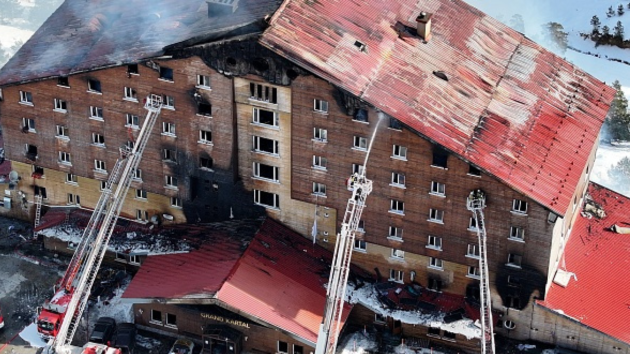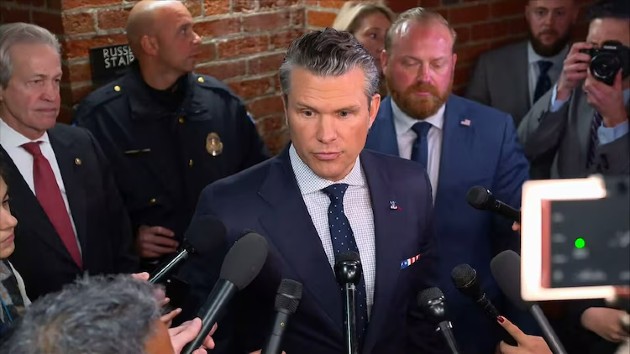Putin’s Ukraine drone barrages are increasingly backfiring on his closest ally
Written by ABC Audio ALL RIGHTS RESERVED on December 5, 2024

(LONDON) — “Europe’s last dictator” — as Belarusian President Alexander Lukashenko has often been termed — thus far appears to have kept his nation out of the worst of the spiralling war engulfing his neighbors to the east and south.
The 70-year-old provided invaluable material and political support for Russian ally President Vladimir Putin in his war on Ukraine, even offering Belarus as a launchpad for the doomed Russian drive towards Kyiv in the early stages of the full-scale invasion.
Since then, Russian forces have used Belarusian territory to launch ballistic missiles into Ukraine. Belarus houses bases at which Russian troops train for battle and hospitals where they recover.
Minsk even now hosts Russian nuclear warheads and Lukashenko brokered the short-lived settlement between the Kremlin and Wagner financier Yevgeny Prigozhin after the latter’s ill-fated 2023 mutiny.
As the war in Ukraine escalated and the enmity between Moscow and its Western rivals deepened, Lukashenko’s apparent hesitance to fully commit to the conflict seems to have bought him some level of freedom from retaliation.
But with Moscow’s drone and missile barrages into Ukraine growing in scale and regularity, Belarusian opposition groups say the danger to their country is increasing.
The Belarusian Hajun Project — an open-source intelligence group banned as an “extremist” organization by Minsk — said a record-high total of 151 drones entered Belarus during November. At least three were shot down by Belarusian air defenses, it added.
One Russian attack in late November saw a record 38 strike drones cross into Belarus, the group said. ABC News could not independently verify the drone flights.
Neither the Belarusian Defense Ministry nor Foreign Ministry replied to ABC News’ requests for comment.
Russian drones were first reported over Belarus in mid-July, their appearance then relatively sporadic. In October, the Hajun Project said it tracked a total of 49 Russian drones flying into Belarusian airspace across the month. The monthly total trebled by the end of November.
At least one drone landed and exploded in the southeastern Gomel Oblast, according to Ukrainian and opposition Belarusian media reports.
According to Ukrainian air force after-action reports, Russian drones enter Belarus near-nightly. The air force has noted that its evolving electronic warfare countermeasures play some role in the increasing number of Russian strike drones going off course.
Minsk has complained of Ukrainian drones violating its airspace. In July, Lukashenko himself demanded that Kyiv ensure “comprehensive measures be taken to rule out any such future incidents in the future which could lead to further escalation of the situation in the region.”
In September, Belarus’ military said it had downed foreign drones.
Chief of the General Staff Col. Sergei Frolov said drones were shot down without specifying their nation of origin. “Timely actions by the air defense forces on duty destroyed all the violators’ targets,” he said in a statement quoted by the state-run Belta news agency.
Jonathan Eyal of the Royal United Services Institute think tank in the U.K., told ABC News that Lukashenko “has always been very careful to calibrate the policy in a way that allows implausible deniability of any involvement in the Ukraine war — and at the same time makes himself useful to the Russians.”
“He also knows that most of the Belarusian population has no interest in being dragged into the war at all,” Eyal added, describing a “balancing act” in which the Belarusian leader has to at least pretend to be defending the nation’s airspace.
“It’s not a great secret that the Russians can do more or less what they want with Belarusian airspace,” Eyal added. “The idea that somehow the Belarusian military is determined to defend its sovereignty is a bit far-fetched.”
“These are very calibrated messages from Lukashenko trying to persuade people — both at home and overseas — that somehow he remains a complete master of his own destiny,” Eyal said.
For Belarus’ pro-Western opposition — many now living in exile following Lukashenko’s crackdown on the mass protests that followed the 2020 presidential election — the drone flights are a sign of Minsk’s weakness.
Franak Viacorka, the chief political adviser to Belarusian opposition leader-in-exile Sviatlana Tsikhanouskaya, told ABC News that drones “are flying over Belarus practically every single night.” An average week sees 40 or 50 UAVs transit border areas, he said.
Viacorka said Lukashenko’s government is working hard to hide any evidence of errant Russian munitions. “It’s very uncomfortable for them to say that the Russians are using our airspace,” he said. “It happens with the agreement of Lukashenko, or perhaps Russia doesn’t even ask Lukashenko for permission.”
Aliaksandr Azarau — a former police investigator who defected and now leads the opposition BYPOL group made up of former Belarusian security employees — said government propaganda seeks to hide the problem while framing all intruding drones as Ukrainian.
“The concern is only for the people who see these drones above their heads near the Ukrainian border,” Azaru said. “The rest of Belarusians don’t think about the drones — it’s not their problem.”
Official Belarusian reports of drones being intercepted, he added, are part of “a political game.” Azaru even claimed that Belarusian military aircraft have held fire and flown alongside Russian drones, effectively escorting them into Ukrainian airspace
When a drone does fall on Belarusian territory, Viacorka said, “the place is cleared immediately” and any witnesses are pressed by security services not to reveal any details.
The issue, he added, is politically sensitive for Lukashenko. “His narrative is that, thanks to him, Belarus has not gotten involved in war,” Viacorka said. “But when people see drones and shells flying over their territory, they see that Belarus is already involved in war.”
“It’s very worrying that Belarus is getting more and more involved,” Viacorka said.
Lukashenko and his Russian allies, he added, are “putting more and more people in Belarus in danger.”
Russia’s access to Belarusian airspace may also pose a threat to eastern NATO nations, three of whom — Poland, Lithuania and Latvia — border the country.
Russian freedom to act throughout Belarusian airspace has “many implications” for regional NATO states, Eyal suggested, as well as for western Ukrainian regions that will be more accessible for Moscow’s Shaheds.
In September, Latvia’s Defense Ministry reported that a Russian strike UAV crashed in the Rezekne region in the east of the country after flying across Belarus.
Since then, “improvements in all levels of Latvian airspace surveillance have been made, as well as in decision-making and information exchange algorithms,” a ministry spokesperson told ABC News. This includes the deployment of mobile air defense battle groups to the eastern Latgale border region, they said.
The procedures for NATO’s Baltic air policing mission “have also been clarified, allowing allied fighters to destroy aggressor drones entering Latvian airspace if necessary,” the spokesperson added.
“Russia has control over Belarusian foreign and domestic policies,” they continued. “Belarus is an additional Russian military district, so the threat coming from Belarus is orchestrated by Russia. Unfortunately, it is not up to Belarus and its citizens to decide how Russia uses Belarusian airspace to achieve its aggressive foreign policy goals.”
“Hybrid warfare is already happening between Russia and the West,” the ministry spokesperson said. “Belarus is just a tool for Russian aggressive foreign policy. In the short term, Russia will continue to use a wide range of hybrid warfare tools to weaken Western countries and divide their unity.”
“The Belarusian regime’s hybrid attack on the Latvian border with artificial migration demonstrates that we must prepare for all possible scenarios including violation of our airspace,” they said.
Copyright © 2024, ABC Audio. All rights reserved.
 KVSP
KVSP 




